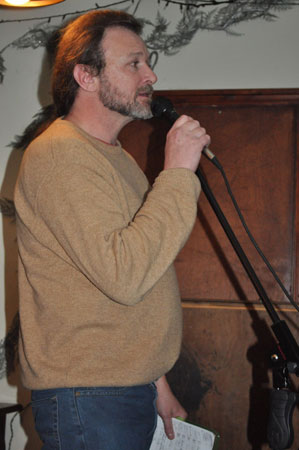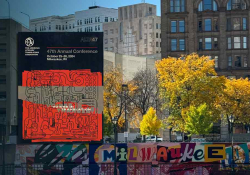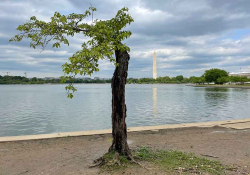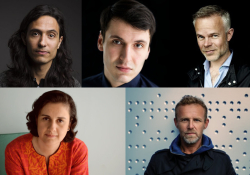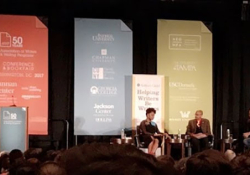From the Mouth to the Mic
Photos from Ó Bhéal, Cork City’s six-years-old-and-still-going-strong weekly poetry reading. Ó Bhéal / Paul Casey
An American fiction writer faces a crisis of self-doubt upon finding the poetry open mic of his literary-tourism dreams in Cork, Ireland.
I stepped out of the drizzle into the buttery light of the Long Valley Bar on Winthrop Street in Cork City, Ireland. The pub was quiet. Half a dozen customers stared at a football match on a TV in the corner. I ordered a Smithwick’s Irish Ale and a glass of water. “Where’s the poetry?” I asked, and the bartender sent me through an empty snug and up a flight of gray stairs to the Hayloft—a second pub above the first. This one stood empty, or nearly so. Ice clicked in my water glass as I took a seat on a wooden bench in a corner beside the untended bar. A young man sat at a table across the small room from mine, munching on salt-and-vinegar Tayto crisps from a plastic bag, sipping a pint of stout, and occasionally wiping a curl of red hair from his eyes. Now and then he picked up his phone to send a text. An older gentleman sat in a corner at the far end of the bar, patting the wisps of white hair atop his head. A microphone loomed on a stand in yet another corner, and the odor of peat smoke floated in on the mist coming through the windows. I nursed my ale and stifled an urge to leave. This is what I came for, I told myself. This is where I belong. But I didn’t believe it.
I had flown some four thousand miles to Ireland, to teach travel writing to students from the University of Oklahoma. Back in Norman, in addition to teaching and writing, I serve as co-host of a small yet delightful open mic for poetry, fiction, and creative nonfiction. But here? Here in Cork I was nobody. Or worse: a tourist. Still, when I found out I would spend June in Ireland, my first impulse was not to tick off a list of sights. Rather, immersed as I am in my own open mic, I Googled the phrase “open mic Cork Ireland.” This brought up Ó Bhéal, Cork City’s six-years-old-and-still-going-strong weekly poetry reading.
I am here to observe, I told myself as I took in the brick-walled room, here to learn. Ó Bhéal was the sort of event our open mic in Norman aspires to become: an indispensible weekly fixture on the local literary scene. Poets are my people. I belong here. Unconvinced, I searched the long, narrow room for a sign. Beneath the windows, a couple dozen books stood on display at the back of a bench. Above the books and between the windows, a pair of framed, yellowed maps hung on the brick wall. Lamps dangled from pulleys in the rafters. Aside from the young man with the crisps, no one knew I was there. I checked my watch. It was 9:17. If the sparse crowd taught me anything, it was that my local open mic’s low summer attendance was not an anomaly.
At around 9:20, a man in a forest-green sweater came in to fiddle with the sound system. Voices rose from the stairwell, and by 9:25 fifteen more people had arrived. A man my age—middle-aged, I supposed—shouldered through the gathering crowd and ducked behind the bar to draw pints and pour whiskies.
“I’m not used to getting here so early,” a woman nearby said, “but I made a special effort.”
By 9:36 the packed pub rumbled with talk of days at work, abandoned poems, writing conferences, and novels in progress. The man in the green sweater introduced the evening’s emcee to the evening’s featured poet, Pauline Fayne. Surely we were about to begin. Then the emcee set her purse on my table, rolled a cigarette, and strolled outside. I nearly followed her, but stood my ground. Or sat it.
The daunting list of readers on Ó Bhéal’s website flashed before my eyes, including many of Ireland’s poetry luminaries (Derek Mahon, Rita Ann Higgins, Desmond O’Grady, and Nuala Ní Dhomhnaill) and England’s current poet laureate, Carol Ann Duffy. And befitting Cork’s progressive spirit, these poets read, chat, and imbibe elbow-to-elbow with the locals.
But I was no local, and I’m not a poet. Not really. Fiction is my bread and butter. I write poems because I hang out with poets back home. Ó Bhéal belongs in the poetry big leagues—or perhaps the Poetry Premier League. As my pint of ale dipped well beyond half-empty, I vowed not to pull my silly little poem about drowning Billy Collins from my pocket. Instead, I struck a compromise with self-doubt and let it glue me to the bench. I would sit and listen, nothing more.
In a letter, Charles Baxter once warned a young writer that “feelings of inadequacy are the black-lung disease of writing.” Somehow, when I read this in an anthology, Baxter’s point hit me with the force of definitive diagnosis for a perplexing ailment. That phrase—the black-lung disease of writing—empowered me to accept myself as a writer. Self-doubt was inevitable. Knowing this cleared space for me to leap over doubts and commit to a writing life. That commitment, in turn, launched an early-thirties career change that sent me back to graduate school and into the company of other good writers, later into teaching, and now to Ireland and this pub.
The scent of warm caramel displaced the peat smoke, and a woman in a black leather jacket sat beside me on the bench. She looked as nervous as I felt, and she didn’t make eye contact for a long time. When she glanced my way, I asked if she was a poet. She nodded. I confessed that I wasn’t. Another woman leaned over from the bar and asked if she had detected a “North American accent.” She had come from Missouri ten years ago, she said, but she lived here now and had just gotten Irish citizenship, in fact.
The emcee took to the mic and managed to quiet the room after five or six attempts. She explained that Ó Bhéal started their evenings with a contest for the best poem written on the spot. Then she solicited “five random words” from the audience—socks, gluttony, spring, absurd, and driving—and gave fifteen minutes for people to write poems. I imagined only a few would do this, but the crowd went silent. Poets of all ages bent over notebooks. The average age hovered around forty, I thought, yet college kids and grandmothers scribbled side by side.
It occurred to me then to write my own poem, more to fit in and fill an awkward silence than to compete. I pulled out my tiny 105x74mm notebook and jotted down the five required words. I kept my pen moving, and soon the words grew into lines.
When conversation revved up again, the emcee—a small woman, even in high-heeled sandals—called an end to our writing period. She mock-seriously explained that the evening’s winner would be decided by a precise count of applause, and she invited the first poet to the mic. No one moved.
“Surely someone wrote a poem,” she said. “You were all so quiet.”
People chuckled, but everyone stayed put.
Finally the émigré from the Show-Me state showed us her poem. A man in his seventies followed. Then came a thoroughly tattooed woman in her early twenties, a younger man in what looked like a fast-food service uniform, and a visiting American college student. She sparked a hearty round of applause that surely put her in the lead. Another awkward silence followed as the emcee called for more poems. Someone nudged the curly ginger guy who was now working on his second bag of crisps. He declined. And, before I could think twice, I broke my vow of silence and walked to the mic.
I stammered an apology for my country’s thorough over-representation at this event, and no one in the room smiled. I took a deep breath and read my five-word challenge poem:
After three days of history,
museums, tours, pickpockets,
and gluttony in Dublin,
We paraded our students
like a dozen ducklings
saddled with absurd luggage
five blocks through the rain
to meet our bus.
Only here it was not a bus,
it was a coach, and on it
there was no one to coach us
through driving on the wrong
side of the road.
In an hour we tumbled
from the coach into the mist
at Glendalough
with ninety minutes
to wander through
the mystical rain.
Then we curved south
through the Wicklow Mountains,
through more rain,
and through the odor
of our own wet socks.
The driver said it has rained
like this all spring
and shown no sign of letting up.
He released us
to the sidewalk,
to the rain,
to find our way
to the dorms.
Someone grumbled
about the weather,
the accents,
the differences between
Gaelic football, football, and soccer.
Team America has landed.
Be kind to us, Cork. Be kind.
The lines about “absurd luggage” and “the wrong side of the road” drew laughs, and I shuffled back to my seat to whistles and a warm round of applause. The poem was nothing, I knew, but now I didn’t feel like an imposter. For a few minutes, at least, I belonged.
Eight or ten more Irish poets followed as I polished off my ale. At least three of those poets were far better than I. I wish I could say I did my best to bolster their rounds of applause, but I was too distracted by the swirl of thoughts that invariably follows a public reading: Did I embarrass myself? Did I sound arrogant? Did people like it? Did my piece even make sense?
In the end, the emcee said the competition was close but “Team America” had edged a couple other strong contenders for the win. All I had to do to claim my prize was return to the mic, say my name, and read the poem again. I accepted the honor on behalf of the University of Oklahoma, which meant nothing to anyone there, then apologized for subjecting them to the poem a second time. Of course, I forgot to say my name, yet the emcee granted my prize anyway: the drink of my choice and a handful of poetry books, including Ó Bhéal’s annual Five Word anthology. By this time next year, I learned, I’ll be a published poet in Ireland.
We took another ten-minute break for drinks and conversation, during which I was welcomed and congratulated by half the people in the room. The woman in the leather jacket nodded and said, “Good stuff.” The former American patted my back. A tall man well into his seventies put a hand on my shoulder and explained the name Ó Bhéal: it means “from the mouth” and refers to an era when the British banned the printing of Gaelic. Irish poems and stories had to be passed along Ó Bhéal. This happened often on the lips of the rebel county of Cork, he assured me.
Later that evening, the featured poet—Pauline Fayne of Dublin—read a selection of pieces from her New and Selected Poems (listen to her reading here). We took yet another ten-minute booze-and-conversation break, then rounded out the night with the open mic (listen to the open mic here). Thirteen delightful poems and one god-awful acoustic-guitar Oasis cover later, I felt more at home at Ó Bhéal than I have anywhere (outside my own house) back in Norman, Oklahoma. As the night drew on, I filled my doubt-blackened lungs with an air that hummed with a roomful of small victories over hesitations and the temptations of silence.
And, as I left the pub and raised my umbrella for the long walk to my apartment in the University College Cork dorms, I vowed to carry the spirit of Ó Bhéal home to Oklahoma. I’ve suffered through a few long dark nights of the soul since that evening at the Hayloft, doubting whether I have strength enough to carry the absurd luggage of my imagination. Yet I trust that when the moment comes, back in Norman, I’ll step up to the mic, and the words will fly from my mouth.
Ó Bhéal Poetry Readings and Open-Mic Nights happen every Monday, well past the official 9:00 p.m. starting time, in the Hayloft above the Long Valley Pub, 10 Winthrop Street, Cork, Ireland.
http://www.obheal.ie/
https://www.facebook.com/obheal.poetry
http://www.youtube.com/user/obheal
Eric Bosse writes short stories, novels, essays, a blog, and the odd, bad poem. His work has appeared in The Sun, Zoetrope, Mississippi Review, and other magazines and journals. Ravenna Press published his story collection, Magnificent Mistakes, in September 2011, with an e-reader version due in September 2012. He lives in Norman with his wife and kids and teaches at the University of Oklahoma.
Literary Festivals in Cork
(recommendations from the Munster Literature Centre)
Cork Spring Literary Festival (Munster Literature Centre): annually in February.
www.corkpoetryfest.net
Cork World Book Fest (Cork City Libraries): annually in April.
www.corkcitylibraries.ie
West Cork Literary Festival: annually in July.
http://www.westcorkmusic.ie/literaryfestival
Kinsale Arts Week: annually in July.
www.kinsaleartsweek.com
SoundEye Festival: annually in July (more experimental/innovative)
http://soundeye.wordpress.com
Cork International Short Story Festival (Munster Literature Centre): annually in September.
www.corkshortstory.net
There’s also a very eclectic arts venue called the Triskel that runs a readings program alongside a music and visual arts program.
http://triskelartscentre.ie/books-events





